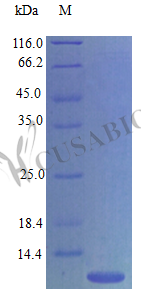Recombinant Mouse C-C motif chemokine 4 protein (Ccl4) is expressed in E. coli and represents the full length of the mature protein, spanning amino acids 24-92. This tag-free protein shows high purity of over 97%, as verified by SDS-PAGE. It appears to maintain biological activity, demonstrated through a chemotaxis bioassay using human monocytes, with an effective concentration ranging from 20-100 ng/ml. The endotoxin level stays controlled at less than 1.0 EU/µg, determined by the LAL method.
C-C motif chemokine 4 (Ccl4) is a chemokine involved in immune responses, specifically in the recruitment and migration of monocytes, T lymphocytes, and natural killer cells. It likely plays a significant role in inflammatory pathways and represents an important molecule for studying immune system functions and mechanisms. Research focusing on chemotaxis and immune cell signaling frequently makes use of this protein.
Potential Applications
Note: The applications listed below are based on what we know about this protein's biological functions, published research, and experience from experts in the field. However, we haven't fully tested all of these applications ourselves yet. We'd recommend running some preliminary tests first to make sure they work for your specific research goals.
1. Chemotaxis Assay Development and Optimization
This recombinant mouse Ccl4 protein is confirmed to be biologically active in human monocyte chemotaxis (active at 20-100 ng/ml) and suitable as a positive control. However, researchers should validate its activity in mouse-specific monocyte/macrophage systems to confirm cross-species reactivity is consistent. The high purity (>97%) supports reliable dose-response studies, but optimal concentrations may need adjustment for primary mouse cells due to potential species-specific receptor affinity differences.
2. Antibody Development and Validation
The high-purity, tag-free Ccl4 serves as a good immunogen for antibody development. The confirmed cross-species bioactivity indicates proper folding of conformational epitopes. However, antibodies should be validated against native mouse Ccl4 from biological sources to ensure recognition of physiologically relevant forms, as the E. coli expression lacks mammalian post-translational modifications.
3. Receptor Binding Studies
The protein is suitable for CCR5 binding studies, but the demonstrated activity in human cells suggests cross-species reactivity that may not fully represent mouse-specific binding characteristics. Researchers should validate binding kinetics in both human and mouse receptor systems to properly interpret species-specific differences in affinity and specificity.
4. Inflammatory Response Research Models
This mouse Ccl4 can be used in inflammatory studies, but the cross-species activity data requires validation in mouse-specific systems. While the protein is mouse-derived, the activity was confirmed in human cells, so researchers should establish dose-response relationships in mouse immune cells to ensure physiological relevance in murine models.
5. Protein-Protein Interaction Studies
The biologically active Ccl4 is appropriate for interaction studies, but the partial sequence (24-92aa) may lack elements present in the full-length protein that affect some interactions. Studies focusing on core CCR5 interactions are well-supported, but interactions with glycosaminoglycans or other modulators may be affected by the truncated form.
Final Recommendation & Action Plan
This recombinant mouse Ccl4 is a validated reagent with demonstrated cross-species bioactivity, making it suitable for the proposed applications with appropriate validation steps. First, establish mouse-specific activity profiles using primary mouse monocytes/macrophages to complement the existing human cell data. For chemotaxis and signaling studies, use the 20-100 ng/ml range as a starting point, but optimize for each specific cell type. When developing antibodies, validate cross-reactivity with native mouse Ccl4 from inflammatory sources. For binding studies, the confirmed bioactivity supports CCR5 interactions, but researchers should determine species-specific binding parameters separately for human and mouse systems. While the partial sequence contains the functional chemokine domain, critical findings should be verified with full-length Ccl4 when studying complex biological contexts. The high purity and low endotoxin make this protein particularly valuable for controlled studies of CCR5-mediated responses across species.




